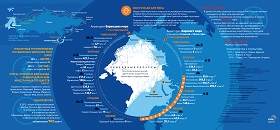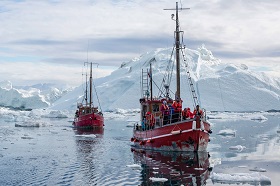The aggravated tensions between Russia and the West over Ukraine have markedly affecte political dynamics in the Arctic. Most of the international media insist that the region is in for another wave of militarization, altering the perception of the Arctic dispute which predominantly deal with national jurisdiction and borders. The most heated row seems to be over the delimitation of the continental shelf in the central part of the Arctic Ocean.
Danish Surprise
Last December 16, Denmark caused a slight sensation by submitting its Arctic claims to the UN Commission on the Limits of the Continental Shelf (CLCS). According to the published papers [1], Copenhagen would like to extend its rights to an area of 895,000 square kilometers encompassing the entire Lomonosov Ridge up to Russia's 200-mile Exclusive Economic Zone (EEZ). Some Danish pundits immediately grew worried that their government's gargantuan appetite would enrage Russia. Karsten Moeller, Senior Analyst at Danish Institute for International Studies, is sure that Denmark's heightened ambitions would hardly make Russia more tractable at the forthcoming talks [2]. Military analyst Commander Johannes Riber Nordby fears that Moscow may respond with a military buildup in the region [3].
However, most officials and experts remain quite reserved and even positive. In an interview with the Politiken newspaper, Danish Foreign Minister Martin Lidergaard underlined he saw nothing provocative in Denmark's CLCS submission and was eager to see the counterclaims of Russia and Canada that should become the basis for future negotiations [4]. What seems important is that Mr. Lidergaard's commentary clearly points to the Danes' readiness for pragmatic bargaining, which means they may curtail the scope of their initial claims.
We should remember that the CLCS is entitled only to an expert appraisal and will make a decision on the substance of the incoming submissions, while the final settlement must come out of the negotiations between the parties. If they fail, the dispute will be brought to the International Court of Justice at The Hague.
The Time Factor
The CLCS is a very busy affair and may considerably delay the examination of the Arctic shelf issues. According to the Danish Geological Survey, the expert opinion on Copenhagen's claim should be completed only by 2027 [5]. In turn, prominent Russian international lawyer Yury Kazmin warns that "for Russia, the process should optimistically take 20-25 years." [6] And Canada would not be able to handle the matter faster.
Hence, the Arctic delimitation talks may last several dozen years, similar to the Russian-Norwegian dispute on the Barents Sea that took as long as 40 years, since there are a host of objective hurdles related to the characteristics of the central Arctic Ocean, i.e. poor knowledge of the area, comparatively low prospects for the discovery of mineral resources, remoteness from the coastline, the permanent icecap, and lack of technologies for the safe and effective development of resources in the harsh environment.
Curiously enough, the illusionary nature of the disputed zone potential may expedite the settlement since the above-mentioned adverse factors generate a veil of uncertainty [7]. Cutting a pie unaware of its contents may bring the negotiators much closer to each other.
Besides, we cannot forget about the political significance of an unambiguous delimitation of the Arctic. If the decision is postponed indefinitely, the situation may generate a weak link in the Russia-Denmark-Canada relationship and damage regional stability. So, the sooner the settlement, the better for everyone.
In fact, the interested parties may launch the negotiations even before 2020 without a CLCS verdict, provided three main conditions for fast-track delimitation of the Arctic are met.
First, Russia and the West should normalize the diplomatic relations hurt by the Ukraine crisis. So far, the sides differ in principle with a hypothetical possibility of a limited military conflict still in the air, which means that any sort of productive interaction in regional settlements is ruled out.
Second, there is still no Canadian official submission to the CLCS which tentatively expected in 2015-2016 [8]. As soon as Ottawa's claim is known, the limits of the intersecting zones will become known to form the basis for the negotiations.
Third, this spring Russia is expected to adjust its claim by providing more details [9].
Under an optimistic scenario, the grounds for official talks may emerge in two or three years, although preliminary consultations between the proxies of the three countries may be held right now.
The Negotiations Format
As for the format of the future talks, there seem to be several possibilities, i.e. a three-party conference, three-plus-one negotiations with involvement of a mediator, and a combined pattern of a series of bilateral consultations transforming into the three-party scheme.
The latter appears organizationally most sensible and thus deserves closer examination. Delimitation of the Arctic's central area appears extremely complicated and will require a lot of agreements on technical, economic and political issues, which should be preferably handled at the preliminary stage within a series of parallel bilateral Russia-Canada, Russia-Denmark and Canada-Denmark consultations. In contrast to the three-party arrangement, for confidentiality reasons the bilateral dialogue seems more proper for expressing the interests, agreements and disagreements, as well as for suggesting the cooperation variants.
In order to combine the tentative accords and define a formula for a final settlement, the sides should then switch to a three-party regime.
The Arctic's Western Front
The current positions of Denmark and Canada on the Arctic delimitation can provide some insights on their future negotiation tactics.
First, Copenhagen and Ottawa are expected to initially agree on the demarcation of their Arctic EEZs to have a united front vis-à-vis Russia.
Second, Denmark's presentation to the CLCS last December prompts its future use of the overstated claims on the Lomonosov Ridge expecting that Russia blinks first and diminishes its claimed areas in 2001. Canada also seems willing to inflate its ambitions in 2015-2016 by including both Alpha and Mendeleev ridges, especially as their geological linkage has been established [10]. In this case, the second overlap with Russian interests appears. Both Copenhagen and Ottawa definitely understand that Moscow would struggle for its expanded zone to the last breath, so even minimal concessions from Russia should mean a major success for Canadian and Danish diplomacy.
Third, in order to maximize pressure on the Russian side and unblock the deadlocks, Denmark is expected to use the tactics of withdrawal, which means removing themselves from the talks to automatically transfer the matter to the UN International Court. The option seems likely because Denmark is traditionally prone to international mechanisms for settling disputes [11], and may also boast a historical victory, as in 1933 the Permanent Court of International Justice, the UN International Court predecessor, recognized its sovereignty over East Greenland [12]. The withdrawal tactics may work if Russian negotiators find the final Danish proposal better than the expected decision of the International Court.
Fourth, Denmark and Canada may appeal to the United States to build up political pressure on Russia, which has been mentioned by Professor Thomas Højrup of Copenhagen University [13]. Moscow is likely to find the trans-Atlantic solidarity objectionable, since the step should complicate its standing.
Fifth, Denmark and/or Canada may attempt to play the Ukraine card, i.e. demand an easing of Moscow's role in Ukrainian politics, especially in its eastern areas, in exchange for curtailing their Arctic claims. Of course, such a step seems quite risky as it may be perceived by Russia as provocative. However, it would be irrational to expect that Copenhagen and Ottawa keep it out of their hypothetical arsenals.
Russia Accepts the Battle
What about potential Russian countermeasures to oppose Danish and Canadian diplomacy?
At the opening stage, it appears sensible to play hardball insisting recognition of the expanded shelf limits as presented by Russia to the CLCS in 2001. Denmark and Canada will fiercely fight back to defend their rights in the intersection zones and appeal to the incontestability of their survey data. This phase is unquestionably central and the trickiest, since each side would try to hit the jackpot and make the opponent say uncle. Hence, Moscow must close its ranks and destroy the Western momentum to have the Canadians and the Danes exhausted and ready for more flexible exchanges.
Another effective countermeasure lies in the unrealistic demands to be probably used by Denmark and Canada. In response, Russia may claim the entire length of the Lomonosov, Mendeleev and Alpha ridges. However, well-known Danish journalist Martin Breum insists that the Danish Ministry of Defense considers such a scenario unlikely expecting that "the Russia-claimed slice of Arctic pizza remains intact." [14]
Finally, Western unity in the Arctic may be shattered by fine-tuning the conflicts between the U.S.A. and Canada on the Beaufort Sea borderline and the Northwest Passage regime, and between Canada and Denmark on the Hans Island. To this end, Russia might throw in attractive alternatives and proposals for cooperation in adjacent and by no means less meaningful areas of the Arctic policy. In fact, Russia and Canada are both interested in defending their rights for managing shipping along the Northern Sea Route and Northwestern Passage. International recognition of the special political and legal status for these shortest sea routes may lay the foundation for a strategic partnership between Moscow and Ottawa for many years ahead, as has been convincingly described by key Canadian Arctic expert Michael Byers [15]. As far as Denmark is concerned, Moscow might offer political support in Copenhagen's dispute with Ottawa over the Hans Island.
***
Delimitation of the Arctic Ocean central portion seems more significant in terms of politics rather than for economic reasons. Actually, Moscow, Copenhagen and Ottawa are going to face quite a challenge. On the one hand, they must act in accordance with the Ilulissat Declaration, i.e. the 1982 UN Convention on the Law of the Sea, and refrain from using force or such threats. But on the other hand, the states yearn for more regional clout through the utmost realization of their Arctic claims. In this context, the Russia-Denmark-Canada talks should turn pragmatic with the focus on objective survey data and subjective political argumentation. The adjusting of positions will inevitably generate dead-ends but the sides are likely to regain prudence through flexibility and expanding the subject field of their talks. Since official Russian-Western contacts have been blurred by Ukraine, today it seems quite promising to test the waters through ties between scholars engaged in the Arctic issues, as was the case with the 1993 negotiations between the Palestinian Liberation Organization and Israel in Oslo.
1. URL: http://politiken.dk/indland/politik/ECE2484640/danmark-goer-krav-paa-gigantisk-stykke-af-arktis/
2. Hannestad, A. Eksperter: Dansk krav om Nordpolen vil irritere Rusland // Politiken. 16.12.2014. URL: http://politiken.dk/udland/ECE2486050/eksperter-dansk-krav-om-nordpolen-vil-irritere-rusland/
3. Ibidem.
4. Udenrigsministeren om dansk Arktis-krav: Det her er en historisk milepæl // Politiken. 15.12.2014. URL: http://politiken.dk/indland/ECE2484866/udenrigsministeren-om-dansk-arktis-krav-det-her-er-en-historisk-milepael/
5. Redder, H. Fire grunde til, at Danmark nu gør krav på Nordpolen // URL: http://nyhederne.tv2.dk/2014-12-15-fire-grunde-til-at-danmark-nu-goer-krav-paa-nordpolen
6. When to Expect UN Decision on Russia's Continental Shelf? // UN Radio. August 24, 2011. URL: http://www.unmultimedia.org/radio/russian/archives/93789/
7. See: Young, O. Political Leadership and Regime Formation: On the Development of Institutions in International Society // International Organization. – 1991. – Vol. 45. – Issue 3. – pp. 281-308; Persson, G. Deadlocks in International Negotiations // Cooperation and Conflict – 1994. – Vol. 29. – Issue 3. – pp. 211-244.
8. http://www.wsws.org/en/articles/2015/01/07/arct-j07.html
9. http://www.gazeta.ru/business/news/2014/12/16/n_6747885.shtml
10. Osadchy A. Splitting the Arctic Ocean // Nauka i Zhizn magazine. February 2008. №2. URL: http://www.nkj.ru/archive/articles/12966/
11. http://www.socialdemokraterne.dk/default.aspx?site=jeppekofod&func=article.view&id=720971&menuID=714432&menuAction=select&topmenuID=714432
12. http://www.socialdemokraterne.dk/default.aspx?site=jeppekofod&func=article.view&id=720971&menuID=714432&menuAction=select&topmenuID=714432
13. Velfærdsstat i forsvarsposition // Information. 19 August 2013. URL: http://www.information.dk/138012
14. Breum, M. Den danske regering overrasker med gigantkrav // Information. 15.12.2014. URL: http://www.information.dk/518859
15. Byers, M. Canada Can Help Russia with Northern Sea Route // The Moscow Times. 09.01.2012. URL: http://www.themoscowtimes.com/opinion/article/canada-can-help-russia-with-northern-sea-route/460127.html









